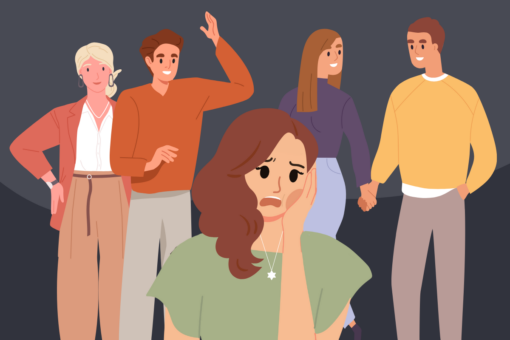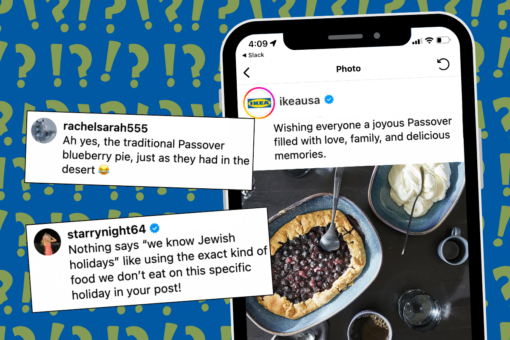Every young Jew, regardless if they went or not, has an opinion on Birthright. The famed free trip to Israel began in 1999 and has since brought tens of thousands of young Jews between 18 and 26 to Israel to see the country. The point of the trip — funded by Jewish philanthropists — is “to strengthen Jewish identity, build a lasting bond with the land and people of Israel, and reinforce the solidarity of Jewish people worldwide.”
So we decided to talk about it all, in our second Alma Roundtable (read the first on dating while Jewish). We gathered #TeamAlma (Molly Tolsky, editor, and Emily Burack, editorial fellow) plus five others: Lior Zaltzman, the social media editor here at 70 Faces Media, Sara Beth Berman, a Jewish educator and writer, Chanel Dubofsky, a writer, Nylah Burton, writer and sexual assault prevention advocate, and Alyssa Connors, a birth doula, nanny, aspiring nurse-midwife, and writer.
First, our Birthright backgrounds:
Emily, 22, went on Mayanot Birthright in winter 2014 with a group from her college.
Molly, 31, went on Birthright in summer 2011 with a group from Chicago.
Sara Beth, 36, has never been on Birthright, but she studied it in graduate school (she has a Masters in Jewish education from JTS, and wrote her thesis about Israel education).
Chanel, 39, went on Birthright in 2003 with Livnot, then staffed a few times while she was working for Hillel at Oberlin and Columbia.
Nylah, 23, is going on Birthright this winter and is “super nervous about the whole thing.”
Lior, 30, is Israeli and had the opportunity to go on Birthright as a soldier, but did not. She’s our #TokenIsraeli!
Alyssa, 24, just got back from an Israel by Foot Birthright trip.
This conversation has been lightly edited and condensed.

Why did you choose to go (or not go) on Birthright? (Or plan to go?)
Sara Beth: I wasn’t eligible. I went on a high school trip to Poland and Israel with USY. I’d always meant to staff but it never lined up for me, schedule-wise.
Emily: I went because I really missed a Jewish community while I was at college, and this trip was my opportunity to meet other Jews from my school.
Chanel: I had just started working for Hillel and my boss was frankly horrified that I’d never been, so it was basically mandatory.
Molly: To me, a free trip to Israel felt like a no brainer. I had never been to Israel before, I like to travel and see new places, and I arranged to go with my best friend, who I no longer lived in the same city as, so it was also just a great excuse to spend 10 days with her.
Lior: I was a soldier, and socially awkward at ages 18-20. I also didn’t feel comfortable about going on a trip where I felt like I had to represent my country and also the IDF in a way. Even though that free trip and time off was SO tempting.
Nylah: I want to go because traveling is something I’ve always wanted to do and I can’t think of a better place to start than my Birthright trip. It’s free and Jewish, so I’m kind of sold based on that.
Alyssa: My sister lives in Jerusalem and I wanted a way to visit her, and Birthright was free! My friend was going on this particular trip, so I figured, why not?
Chanel: It was my first time out of the country and there is no way I’d ever have been able to afford it if it hadn’t been for free. I’ve still never paid for a trip to Israel; every time I’ve gone, the organized Jewish community has paid for it.
Molly: So basically we all like free things.
Because Birthright is known for being this free trip, do you feel like there are strings attached?
Molly: I felt like I was guarding myself against propaganda when I went. From everything I had heard, I felt like I was probably going to be shown a one-sided view of Israel and I had to keep that in mind.

Nylah: I thought about that, but I’m pretty opinionated, so I don’t think a glossed-over tour will change my mind on certain political issues. And like, the fact that they want participants to become more involved in the Jewish community isn’t an issue for me at all because that’s something I think is important.
Alyssa: I felt the same way, Nylah, before I went. I felt like I shouldn’t ask too many questions or be too critical, since I was taking advantage of a “gift.”
Sara Beth: I felt that on trips when I was younger and less informed. Now, I’m annoying and bring up politics constantly (not just in Israel).
Lior: From a soldier’s perspective, [it] kind of depends on how serious and mature you are. For me, I was full of fear and taking myself a little too seriously… I don’t think I could’ve just gone and enjoyed the trip and just socialized without feeling responsible to represent my country/uncomfortable about expressing my political opinions. But I know for a lot of soldiers, it’s just a good time.
Molly: I also felt like I wasn’t informed enough about everything going on to really have an opinion/be able to ask the right questions.
Nylah: I think what trip you sign up for influences that. The people I’ve talked to who went on more social-justice themed trips or like the culinary trip didn’t feel like people wanted to brainwash them.
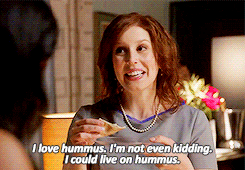
Did you expect Birthright to be informative? Is that an expectation people have?
Molly: I did not expect it to be informative, because I didn’t expect it to “get real” about what was going on. I kind of expected the sugarcoated experience.
Chanel: I also think it depends on the school you go with and the school you share a bus with.
Sara Beth: And also when you went. I think it was more surface for my peers years ago. Now, these discussions inform the work.
Lior: I remember the first time I went to Israel with my husband, it was his second time there after going on Taglit [Birthright] and he was like, wow, this is SO MUCH BETTER. He went on Mayanot and I think he really disliked the political and religious aspect. He just liked having the experience of just, a local. Where you can freely discuss politics.
Molly: That was the biggest effect Birthright had on me — it made me want to go back and just visit Israel the way I want to, not with an organized trip.
Chanel: I think that’s why the extension opportunity is so potent.
Nylah: I definitely want to extend, but mostly because I want to spend time with my friends and travel to other places in the area. My friend and I are planning to go to Jordan so that’ll be dope.
Alyssa: After my trip, I went to the West Bank with a few others. It was crucial for me. But we were definitely black sheep when we told others we were going, so we tried to keep it on the DL.
Emily: Wow, what was that like?
Alyssa: It was surreal. My sister used to organize tours so she took us to a few cities and villages over three days. There’s an official “extend” trip to the West Bank but they only run it twice a year.
Did Birthright change your feelings towards Israel?
Alyssa: I kept thinking of it like a relationship to a person. I would never think anyone is perfect. So why would I think a place is perfect?
Nylah: I feel like people come back from Birthright and a lot of them have really strong attachments to Israel. One of my friends even made aliyah because she loved the trip so much.

Chanel: I was a pretty blank slate when I went. I didn’t have a day school education or anything, so I hadn’t really heard Things About Israel. It totally worked on me. I cried when the plane took off. It seriously felt wrong to leave.
Molly: I was also a blank slate when I went in, but I didn’t have that experience, Chanel. I mean I liked Israel as a country, but I didn’t leave feeling like I had this personal attachment to it.
Chanel: I’ve also gone through various stages of Jewish observance, and right now, while I’m not observant at all, Israel still very much has its grip on me.
Did you feel pressure to have a meaningful experience in Israel?
Sara Beth: I remember I didn’t have the Meaningful Moments where I was supposed to on my high school trip. But I had some of them. This after coming from Poland, where I couldn’t believe it was a place in color, and not black and white like the movies.
Molly: I had the same experience with the Meaningful Moments. They just weren’t happening for me because it felt too forced… After I came back I wrote an op-ed for the Forward about how I was at the Western Wall and everyone was crying and having these Moments and all I could think about was falafel.
Lior: Molly, I felt the same way in Poland that you did at the Western Wall.
Emily: Okay, but I did have a Meaningful Moment on the trip… and it didn’t feel forced at all. I cried a lot!
Molly: What was it??
Emily: So when you do the Bedouin tents part of the trip, we dropped our stuff in the tents, and then hiked into the desert and looked at the stars. The rabbi (or tour guide? I can’t remember) on the trip asked all of us to take time to just find a spot and sit and think about whatever — and I just felt really grateful to be there, under the stars, in Israel, and to be Jewish… as we walked out of the desert I was with two of my close friends and we were all like very, very emotional.

Chanel: STAFFERS LOVE WHEN PARTICIPANTS CRY. (Sometimes.)
Sara Beth: “We measure success in gallons of tears.” A staff member once said that to me at camp but he could’ve said it anywhere.
Molly: Omg, do you get like points for making participants cry?
Chanel: Hashem gives out extra points for that, yes.
Lior: Aw, I still have these meaningful moments in Israel. Where you’re like somewhere and it’s just so beautiful and special and you’re not thinking about the politics and you’re just like, wow, this place is really special.
Sara Beth: Stars are really moving. You don’t get to see them in many cities because the night sky is blocked out by city lights.
Lior: That’s why I do tell people, Israel is an amazing place for tourists because as far as nature and gorgeous cities are concerned, it’s amazing.
Emily: Also, Yad Vashem was really powerful for me. I had never been to any type of Holocaust museum before.
Lior: Oooh I’m super curious about that. I grew up so saturated with the Holocaust, what was that like?
Emily: I mean, I went to Hebrew school for eight years. I grew up in a very (reform) Jewish family. I just— the hall of children? Or whatever it’s called, at the very end — it puts it into very overwhelming terribleness. The scope of which is never conveyed elsewhere.
Lior: Yes, the children part is always the most harrowing.
What about the other parts of the trip — the drinking, the party atmosphere some trips have, the hook-up culture?
Alyssa: It’s part of their trip algorithm!
Lior: Did you guys drink a lot? Sorry I know that’s not exactly connected to hook-up culture but also it is.
Alyssa: Our staffers were really strict.
Molly: The nights that we could drink, I drank. Like when we were out in Tel Aviv or one night at a hotel where the bar was open all night. It was probably just like two or three nights though?
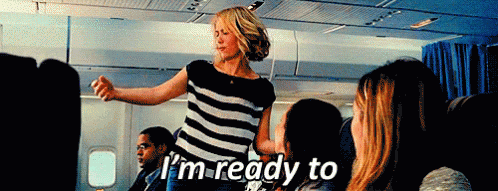
Chanel: So I don’t drink and I didn’t drink on the trip, but I did get my nose pierced in Eilat after the trip.
Lior: I mean, like, everyone I went to the army with did call it “shaglit.”
Emily: Omg, shaglit!
Alyssa: I heard that the soldiers say “leave for Birthright a boy, come back from Birthright a man.”
Emily: One of my friends hooked up with one of the soldiers and everyone was so proud of her — it was so weird! We still talk about him in a group chat!
Molly: And the male soldiers seemed to be looking for that, specifically. Each one of them sort of picked a girl and went for it on my trip (not all successfully, though).
Lior: Yeah I mean, I think some female soldiers are also happy to hook up but yeah, for the men it’s like almost par for the course. Although I had male friends who went on Birthright in the army and who were in relationships and still had a good time.
Molly: I had a serious boyfriend at the time so I wasn’t looking to hook up, but I definitely felt like that was the culture all around me.
Nylah: Putting a group of young people in a different country with gorgeous people is always gonna lead to banging.
Chanel: As a staffer, I think there’s a point where you realize that you can’t control the drinking that happens after hours. I did worry that people were involved in non-consensual stuff, which, surprise! They were.
Nylah: The Birthright trips need to do training or conversations about consent.
Molly: How much of this is Birthright vs. putting a group of 18 to 26-year-olds together, anywhere?
Chanel: I think the soldier element really bumps it up.
Alyssa: My trip didn’t have a single hook-up, weirdly enough. But there was plenty of toxic masculinity to make up for it.
Lior: From the Americans or the Israelis?
Alyssa: Both. One guy was asked to leave though, an Israeli.
Molly: Oh man, what did he do?
Alyssa: He was creeping. Like in a classic dude way but he did it to too many people.
Nylah: Ew.
Alyssa: Like every woman. And when one girl finally told the tour guide, they were like, “Why didn’t anyone tell me before?” and we were all like… because it’s normal. It’s just not normal when it’s 20 women. They handled it well.
Nylah: Well, it shouldn’t be normal if it was only one girl! That’s how people get away with doing stuff over and over again. Cause non-consensual stuff one time is “eh, what else did you expect?” and repeatedly is “this guy is a sicko” but in between all that, the person is hurting so many people.
Lior: It sucks because I think there’s a lot of toxic masculinity both in college culture and in Israeli culture/military culture.
Sara Beth: Down with toxic masculinity!

Molly: It’s funny because I actually found the Israeli men on my trip to be pretty sensitive and not all hyper masculine. One would stay up late with me to write short stories together!!
Lior: Omg, THAT IS SO SWEET!
Molly: He was also the most beautiful man I’ve ever seen. Not to objectify him or anything…
Lior: And yet you didn’t hook up! You just wrote short stories together.
Did you feel the trip tried to convince you to date/marry/have babies with another Jewish person? Did it change your opinion on that?
Sara Beth: The discussion on “endogamy” makes me uncomfortable now that I’m older. When I was younger, it seemed reasonable. Let’s get them in a bus and see who sticks, so to speak.
Molly: I was dating a non-Jewish guy at the time, who I was moving in with a week after I got back. I did feel like they were trying to convince us why it’s a good idea to marry a Jew, and it made me very uncomfortable, like I was a disappointment to them.
Alyssa: Our Jewish identity prompt (there was only one) was: How do you ensure Jewish continuity? Which basically lead to a conversation about whether intermarriage was going to ruin us. So yes, it felt embedded in the agenda/structure of the trip.
Chanel: I didn’t meet anyone and I wasn’t trying to, but it definitely was the first part of messing me up re: Judaism and marriage and expectations.
Lior: It’s just such a non-issue in Israel because of course you’re going to marry a Jew. I only realized intermarriage was this huge thing when I started working in Jewish media here.
Molly: They didn’t change my mind, though. Only recently have I thought that maybe I would like to date a Jewish person after all, but that’s coming from more personal reasons, not what the Jewish community wants.
Sara Beth: I think the perpetuating the Jewish people piece was put in place when Birthright was started. And I’ve had way more, deeper conversations about what makes a Jew, and a Jewish family, and so talking about the “marry someone on the bus” stuff now seems so antiquated. Like what year is this already?
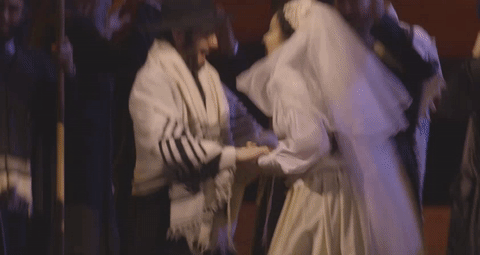
Alyssa: There were only five people with two Jewish parents on my trip. Everyone else was half. And there was this feeling like, “Wow this is how lost we are.” But if we weren’t all half then we wouldn’t even be here asking these questions..
Nylah: I think Jewish continuity is more about how you raise your children than how your partner identifies, and it sucks to feel like your community doesn’t support your choice of partner.
Alyssa: That was part of the discussion for sure, Nylah.
Sara Beth: Also some people don’t want to have kids.
Nylah: FACTS.
Alyssa: To me, Jewish continuity becomes more of a question of survivalism. It’s not how do we keep around this thing that is amazing because it’s amazing. It’s how do we make sure to keep around this thing no matter the cost. Even if it changes its shape in the process.
Nylah: Jewish continuity is still a good theme. But it can entail so much more than marriage. Like culture, food, literature… all of this is part of that.
Molly: Especially food.
Do you think there’s a better way for this type of program to exist? What’s a “Better Birthright”? What would that look like for you?
Chanel: A better Birthright would be more about critical thinking, or in some way about critical thinking. And I don’t just mean in terms of Israel and Palestine, I mean about everything we’re talking about.
Molly: I, for one, would have loved a trip where I did feel like I learned more about Israel — its history and its current politics. And also just a trip that SHOWS YOU ISRAEL and let’s you make up your own mind about how you feel about that.
Lior: I think Israel is pretty, and I think you can have a perfectly great free trip and come back loving it more if it were just, look at how awesome this very tiny country is. But then there’s the whole political aspect.
Chanel: I do think the free trip aspect has the potential to be really equalizing. Like, not all Jews have money!
Emily: Yes!

Sara Beth: As a camp person, I think that you create a safe space for learning with groups. Seeing things, feeling things, and meeting people without necessarily putting your face on their face. Travel is not just the myths that can be presented by tourism boards and “hot sexy soldiers!”
Chanel: One of my biggest issues with organized Jewish life is that it’s so afraid of young people’s intelligence. Like, if we are transparent with you, you won’t be able to handle it and you’ll abandon it.
Alyssa: Birthright right now is Jewish in its essence and is trying to build a Jewish future (Jewish continuity). But to me, a Better Birthright would include an essential piece of Jewish tradition that it’s currently missing, which is asking questions. Let us see the complexities and be secure enough in yourself to know that we’ll choose to still love you.
Lior: That’s so American of y’all. I mean I love it.
Sara Beth: Which part, Lior?
Lior: My Jewish education was all about not asking questions about Israel and buying these slogans.
Chanel: I don’t think that’s so different from Jewish education now, honestly.
Alyssa: Ask questions — except about Israel.
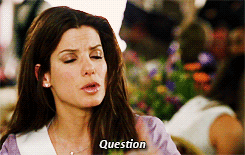
Lior: I mean, I did legit experience culture shock here [in the U.S.]. I think it’s interesting for the two Jewish “cultures” to kind of learn about each other, because I think we are very different.
Molly: Maybe there needs to be a trading places type Birthright where you literally swap lives between Israelis and Americans.
Emily: Omg, what a CONCEPT!
Lior: I’m so into it.
Nylah: That’s a great idea.
Sara Beth: There’s plenty of evidence that cultural interaction — mifgash, aka meeting people — builds community.
Alyssa: Everyone that does Birthright should have to opportunity to extend and go to the West Bank! There should be organized trips after each Birthright trip. And let us talk with Palestinians.
Nylah: Do Palestinians want to talk with us though? It seems like it might feel tokenizing.
Alyssa: We met with an organization called Youth Against Settlements in Hebron. They were definitely down to chat.
Lior: I know a lot of really amazing Palestinian Americans, but I didn’t grow up getting to know a lot of Palestinians. But the more cultures you can meet the better.
Nylah: That needs to change.
Chanel: But this is the thing — Birthright does not want that to happen. That’s what I meant when I said the organized Jewish community is afraid of intelligence.
Sara Beth: I would say that most people on a one-on-one basis are just people, and just see people as people. It’s the same idea behind like “Oh I don’t hate all [type of person], I am friends with one.” Except instead of being tokenized, meeting an other allows you to realize that people are all just people. Mifgash without the hot soldier visitor has potential.
Alma Roundtable is a new series where we gather writers to discuss complex issues facing Jewish millennial women. This sounds so serious. We promise it’s more casual. If you want to see a topic discussed, please e-mail us at hello@heyalma.com.

